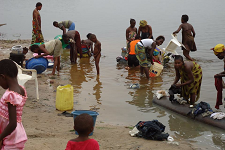In his message in relation to World Health Day that has been observed annually on 7 April, World Health Organization (WHO) Regional Director for Africa, Dr Matshidiso Moeti, urged African states to implement Early Warning, Alerts and Response Systems (EWARS) to identify potential risks for climate-sensitive water- or vector-borne diseases.
“For example, a dashboard measuring cases exceeding the endemic level helped detect a malaria outbreak in Ethiopia in 2020. A malaria emergency preparedness and response plan was subsequently developed,” he said.
Below is her full message:
“World Health Day has been observed annually on 7 April, since 1950, to commemorate the anniversary of the founding of the World Health Organization (WHO) two years previously. This year’s theme, Our Planet, Our Health, serves as a timely reminder of the inextricable link between the planet and our health, as the burden of noncommunicable and infectious diseases rises alongside growing incidence of climate-related challenges.
Climate change is manifesting in increasing temperatures, rising sea levels, changing rainfall patterns, and more frequent and severe extreme weather conditions. WHO estimates that more than 13 million annual deaths globally are due to avoidable environmental causes, including the climate crisis.
With direct consequences for the key determinants of health, climate change is negatively impacting air and water quality, food security, and human habitat and shelter. The knock-on effect for the burden of heart and lung disease, stroke and cancer, among others, is evident from statistics that point to NCDs representing a growing proportion of Africa’s disease burden.
In the African Region, NCDs are set to overtake communicable diseases, maternal, neonatal, and nutritional conditions combined, to become the leading cause of death by 2030. COVID-19, along with spiraling obesity, diabetes and hypertension rates, compounds the challenge, highlighting the urgency of a multi-sectoral response.
During the past two decades, most public health events have been climate-related, whether they were vector- or water-borne, transmitted from animals to humans, or the result of natural disasters. For example, diarrhoeal diseases are the third leading cause of disease and death in children younger than five in Africa, a significant proportion of which is preventable through safe drinking water, and adequate sanitation and hygiene.
However, one in every three Africans faces water scarcity, while about 400 million people in Sub-Saharan Africa alone lack basic access to drinking water. About 45% of all child deaths are also associated with malnutrition, which is known to be linked to diarrhoea.
Meanwhile, a heating world is seeing mosquitos spread diseases further and faster than ever before, with serious consequences for African countries which reported 94% of the 229 million malaria cases recorded globally in 2019. Deaths due to malaria in Africa accounted for about 51% of all malaria deaths worldwide.
In 2018, African health and environment ministers endorsed the 10-year Libreville Declaration on Health and Environment in Africa, signed in 2008. This is a WHO- supported framework aimed at promoting government investment in addressing environmental problems that impact human health – such as air pollution, contamination of water sources, and ecosystem damage.
Under the auspices of this Declaration, we, as WHO in the African Region, support Member States to conduct vulnerability, situation and needs assessments, and to create Health National Adaptation Plans (H-NAPs). We also support countries to submit National Adaptation Plans (NAPs), comprising essential public health interventions, to the United Nations Framework Convention on Climate Change.
Recent examples include the implementation of projects in Ethiopia, Ghana, Malawi, Mozambique, Tanzania and Zimbabwe. These focus on issues including climate- resilient water and sanitation, assessing the capacity of health facilities to cope with climate-change induced drought, and strengthening health systems resilience.
Many countries have implemented Early Warning, Alerts and Response Systems (EWARS) to identify potential risks for climate-sensitive water- or vector-borne diseases. For example, a dashboard measuring cases exceeding the endemic level helped detect a malaria outbreak in Ethiopia in 2020. A malaria emergency preparedness and response plan was subsequently developed.
With Africa’s population projected to grow to 2.5 billion by 2050, we can expect burgeoning urbanization into areas exposed to natural hazards, and a concomitant increase in associated injuries, disease and deaths. As such, I urge our Member States to urgently initiate adaptation and mitigation actions.
Governments, civil society, nongovernment organizations and communities need to work together, empowering one another to ensure the continued delivery of essential health services during future extreme events, while containing the growing incidence of environment- and lifestyle-related diseases. We cannot afford to lose sight of the fundamental truth that the climate crisis, the single biggest threat facing humanity today, is also very much a health crisis,” she concluded her message.

